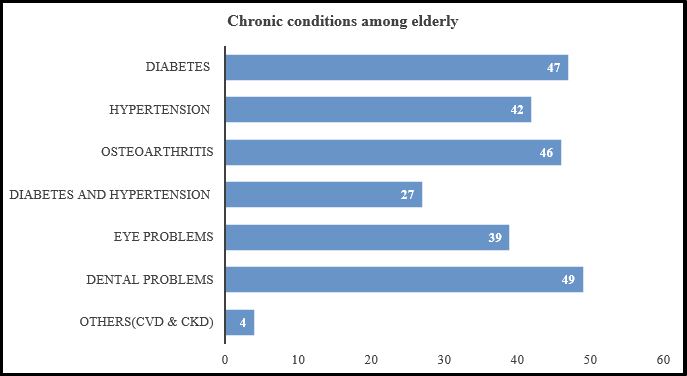PERCEIVED SOCIAL SUPPORT AMONG ELDERLY INDIVIDUALS RESIDING IN URBAN BENGALURU: A CROSS-SECTIONAL STUDY
SOCIAL SUPPORT AMONG ELDERLY
Abstract
Introduction
Increase in life expectancy results in an increasing elderly population which contributes to 9.3% of global population. With epidemiological transition of diseases, the burden of chronic morbidity conditions will also increase with an effect on Quality of life, which demands social support especially among elderly individuals. Hence the present study was taken up to assess social support among elderly individuals residing in urban field practice area of Bangalore Medical College & Research Institute (BMCRI), Bengaluru.
Objective: To assess the perceived social support among elderly population residing in the urban field practice area of BMCRI
Methodology:
A cross sectional study was conducted to assess the perceived social support among 100 elderly population residing in the urban field practice area of BMCRI. Simple random sampling technique was used. Data was collected using validated Multidimensional Scale of Perceived Social Support (MSPSS) questionnaire along with socio-demographic factors.
Results: In this study, the mean age of the elderly individuals was 67.0 + 5.90 years, total social support score was 59.2 + 17.97. Perceived social support was found to be statistically significant found between characteristics gender, educational status, marital status, earning status, marital status, earning status, support obtained for medication and previous hospitalization. (p<0.05)
Downloads
References
2. Park K. Textbook of Preventive And Social Medicine. 26th ed. Banarsidas Bhanot publishers; 2021. p. 658-60
3. World health statistics 2020: monitoring health for the SDGs, sustainable development goals. Geneva: World Health Organization; 2020.
4. Situation Analyses: Backdrop to the National Health Policy.Ministry of Health and Family Welfare, Government of India; 2017
5. World Population Ageing 2020 Highlights. Population Division of the United Nations Department of Economic and Social Affairs (UN DESA). United Nation; 2020. Available at: https://www.un.org/development/desa/pd/.
6. Facts about ageing and health. World Health Organisation; 2017. Available at: https://www.who.int/news-room/fact-sheets/detail/10-facts-on-ageing-and-health
7. Mental health of older adults. World Health Organisation; 2017. Available at: https://www.who.int/news-room/fact-sheets/detail/mental-health-of-older-adults
8. Unsar S, Erol O, Sut N. Social Support And Quality Of Life Among Older Adults. Int J Caring Sci. 2016;9(1):249.
9. Paul NS, Asirvatham M. Geriatric health policy in India: The need for scaling-up implementation. J Family Med Prim Care 2016;5:242-7.
10. Ioannou M, Kassianos AP, Symeou M. Coping with depressive symptoms in young adults: Perceived social support protects against depressive symptoms only under moderate levels of stress. Front Psychol. 2019;9:1–11.
11. Charles S, Carstensen LL. Social and Emotional Aging. Annu Rev Psychol. 2010 ; 61: 383–409.
12. Mary E, Smith W. Assessing perceived social support. Plenum Press, New York; 1997
13. Zimet G, Dahlem N, Zimet S, Farley G. The Multidimensional Scale of Perceived Social Support. Journal of Personality Assessment. 1988; 52(1):30-41
14. Unsar S, Dindar I, Kurt S. Activities of daily living, quality of life, social support and depression levels of elderly individuals in Turkish society. J Pak Med Assoc. 2015;65(6):642–6.
15. Lino VTS, Portela MC, Camacho LAB, Atie S, Lima MJB. Assessment of Social Support and Its Association to Depression, Self-Perceived Health and Chronic Diseases in Elderly Individuals Residing in an Area of Poverty and Social Vulnerability in Rio de Janeiro City, Brazil. PLoS One. 2013;8(8).
16. Seby K, Chaudhury S, Chakraborty R. Prevalence of psychiatric and physical morbidity in an urban geriatric population. Indian J Psychiatry. 2011;53(2):121–7.
17. Mahajan G. Textbook of Preventive and Social Medicine. 4th ed. Jaypee Brothers Medical Publishers (P) Ltd; 2013. p. 637-41
18. Rajeshwar D., Shambhaunath Singh, Pankaj Mala MD. Need assessment study among urban elderly; 2008. Available at: https://www.helpageindia.org/pdf/surveysnreports/needassessment.pdf
19. Wang HH, Wu SZ, Liu YY. Association between social support and health outcomes: A meta-analysis. Kaohsiung J Med Sci. 2003;19(7):345–50.
20. Ali A, Deuri S, Singh A, Deuri S, Jahan M, Verma A. Perceived social support and life satisfaction in persons with somatization disorder. Ind Psychiatry J. 2010;19(2):115.

Copyright (c) 2023 Author (s). Published by Siddharth Health Research and Social Welfare Society

This work is licensed under a Creative Commons Attribution 4.0 International License.


 OAI - Open Archives Initiative
OAI - Open Archives Initiative


